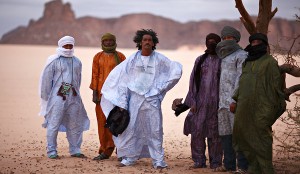Tinariwen’s Tuareg Blues
Tinariwen, the Tuareg group, is back on tour in the U.S. They perform here in LA as part of the Ooh La La Festival organized by the French government. The show is Friday night at the El Rey, and they perform alongside Nouvelle Vague and Etienne de Crecy. Guests on Tinariwen’s set include members of TV on the Radio.
Besides the fact that Tinariwen—the name means “desert”–has become so familiar both here and in Europe, besides the fact that they’ve been touring since 2001, that Robert Plant loves them, and that they’ve done Coachella, KCRW’s World Festival at the HOllywood Bowl among other things–is that the blues mode is familiar to most of us. Rather than moving through a series of chords, what you get is one base key and everything moving in relation to that “home plate” key. This is the hallmark of all the great Mississippi Delta blues that we know and love.
But there is another reason for this affinity. Most slaves coming to the U.S., to work the fields in North Carolina, Georgia, Mississippi, and Louisiana came from Senegambian culture, which comprised Mali, Senegal, Niger, and other countries in the Sahel region between the Sahara and forest Africa further south. The Senegambian slaves coming to the U.S. were farmers and knew how to plant and harvest. They also were monotheistic, believers in Islam. Ned Sublette, in his masterful study Cuba and its Music, asserts that monotheistic cultures produced monorhythmic music–no chords, no polyrhythms. Slaves coming from the large swath of precolonial land in forest Africa known as Angola–from Congo, for instance–were polytheistic, believers in many gods, and because of this were polyrhytmic—remember that in Cuba, Haiti, and Brazil you get a polyrhythm music with many drums weaving in different rhythms. Each deity, or orisha, had certain attributes and certain sacred rhythms were devoted to them. Also the polytheistic religions of Congolese slaves synchronized well with the many saints in the Catholic religion that went into the New World colonies of Cuba, Brazil, and Haiti. On the other hand, And there is no blues in Brazil or Cuba. None at all. The Senegambians didn’t go there.
And so Ry Cooder, Bonnie Raitt, and Robert Plant love the big modal groove of both Malian bluesmen like the late Ali Farka Toure and Tinariwen. So do many KCRW listeners. Tinariwen, made up of former mercenary nomads who traded their guns for guitars, make for a tasty and soulful musical experience that you can truly groove to. It’s better to make good music and bring people together than to fight border skirmishes anyway.
The band were at KCRW doing a live set on Morning Becomes Eclectic today. Here is a clip from that live session.
← BACK

